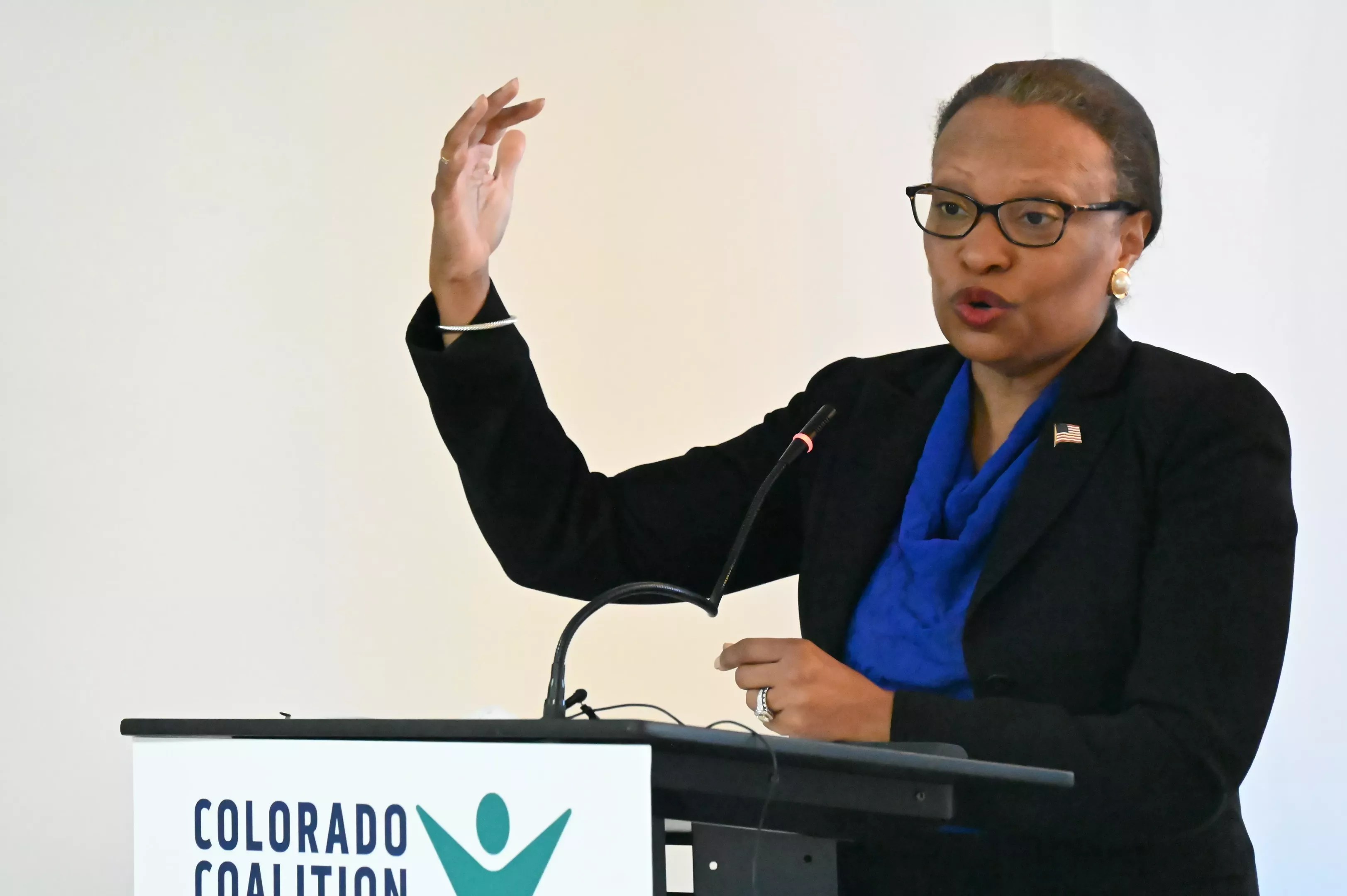
Bennito L. Kelty

Audio By Carbonatix
The top housing official in the country gave her blessing to the affordable housing projects that the City of Denver is supporting, but warned that the city will have to rely on less federal funding in 2025. Still, during a visit to the Mile High on October 28, Adrianne Todman, the acting secretary of Housing and Urban Development, had nothing but good things to say about the city’s efforts to solve homelessness and build affordable housing under Mayor Mike Johnston.
“Denver is doing what’s good for Denver, and it’s a great job,” Todman says. “I had the opportunity to sit and talk with Mayor Johnston. What a fabulous mayor. He has a great vision for affordable housing for this city.”
Todman was in town to tour Renewal Village, a 215-unit apartment complex at 200 West Werner Place in Globeville, which is run by the Colorado Coalition for the Homeless out of a converted Clarion Inn. The purchase and renovation of the property cost $38 million; the City of Denver chipped in $3.2 million, and HUD put in $10.4 million of leftover federal COVID recovery funds from the America Rescue Plan Act (ARPA).
Most of the residents at Renewal Village stay there with the help of housing vouchers that keep the rent below 30 percent of their income and have on-site substance-abuse treatment, health-care services and individual case management. Eighty-one units, including sixty for veterans, are designated for short-term stays for people getting off the streets. In September, Denver City Council approved an agreement with the Renewal Village Housing Corporation allowing the use of state-allocated housing vouchers.
Todman is the former deputy HUD secretary; she moved into an acting HUD secretary role on March 22, after predecessor Marcia Fudge resigned and left the public sector. When she was in her deputy role, Todman recalls, Johnston came to Washington, D.C., and asked what resources the federal government could send to Denver.
“He’s very forward-looking,” Todman says. “He’s trying to use all the tools in the tool kit, and HUD is there to provide him all the assistance his team needs.”
Todman says she wanted to highlight the site as “a great example of what you can accomplish when there is collaboration at the government level with the private sector,” and notes that it’s important to convert existing sites to solve the housing crisis.
“We’re going to have to do more of that,” she says. “We may not be able to build ourselves out of our housing challenges, so we’re going to have to take underutilized hotels, underutilized schools, underutilized office spaces and provide housing.”
Johnston has no problem doing that. Since he became mayor in July 2023, the Department of Housing Stability has spent about $42 million on buying hotels, according to HOST, with $17 million of that coming from leftover ARPA funds.
Most of HOST’s spending last year went toward buying the 194-unit Best Western at 4590 Quebec Street for $15.7 million, which came from ARPA funds. The city is leasing the nearby 300-unit DoubleTree at 4040 Quebec for about $700,000 this year, but it will purchase the site at the end of the lease for $42 million.
The city also has a $1.3 million lease for the 300-unit former Embassy Suites at 7525 East Hampden Avenue; that deal expires at the end of November, at which time the city expects to purchase the hotel for $31 million.
All of these sites were used for All In Mile High, Johnston’s plan to house 1,000 people last year and another 1,000 this year. According to Johnston, he’s achieved both of those goals, ringing the victory bell on October 21. According to HOST, it cost the city $56.3 million to house 2,000 people – the amount HOST spent on All In Mile High between Johnston’s inauguration on July 18, 2023, and May 9, 2024.
Next year, All In Mile High is expected to cost the city upwards of $58 million. The city estimates that it will spend about $30,000 a year per person for the 2,000 people served by Johnston’s All In Mile High initiative; the mayor plans to house still more.
But ARPA funds will expire in 2025, and the city will have to find other ways to fund All In Mile High. HOST expects to pull $28 million from its general fund to replace the costs ARPA was covering, including servicing these hotel sites plus three micro-communities and offering behavioral and physical health needs. About 62 percent of the funding for All In Mile High came from the federal government.
Although Todman promises HUD will help Johnston and the nonprofits in Denver with affordable housing projects, she admits that “if we want to help teachers and firefighters and everyone else who strives for affordable housing to get access to that, as a federal government, we need to do more.”
Part of the problem, she says, is that President Joe Biden and Vice President Kamala Harris haven’t given HUD as much support as it wanted.
“Our president and vice president propose budgets every single year, and we have not received the outcome that we’ve wanted in terms of how much funding we need,” she says. “But we won’t stop fighting.”
According to Todman, one of the most important tasks for the federal government heading into 2025 will be to replace ARPA funds that were used for housing. For cities like Denver, she adds, housing is a crisis just like COVID.
“The America Rescue Plan was an extraordinary infusion of funds tied to a public health crisis,” she says. “But we are still experiencing housing challenges that some people describe as a crisis as well.”